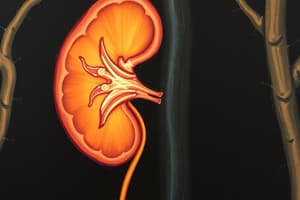Podcast
Questions and Answers
What is the main function of the excretory system?
What is the main function of the excretory system?
Maintaining osmotic balance and getting rid of metabolic wastes like carbon dioxide and nitrogenous wastes.
Which organs play roles in the excretory system by excreting water, substances, detoxifying, and excreting gas waste?
Which organs play roles in the excretory system by excreting water, substances, detoxifying, and excreting gas waste?
Skin, liver, and lungs.
What are the key organs in the excretory system responsible for producing and excreting urine?
What are the key organs in the excretory system responsible for producing and excreting urine?
Kidneys, bladder, ureters, and urethra.
What is the functional unit of the kidney responsible for processing waste products from the blood to create urine?
What is the functional unit of the kidney responsible for processing waste products from the blood to create urine?
What role does the glomerulus play in the nephron?
What role does the glomerulus play in the nephron?
What are the different segments involved in the process within the nephron?
What are the different segments involved in the process within the nephron?
What regulates water reabsorption in the collecting duct of the nephron?
What regulates water reabsorption in the collecting duct of the nephron?
How are substances reabsorbed back into the body in the nephron?
How are substances reabsorbed back into the body in the nephron?
What controls the reabsorption and secretion of substances in the nephrons?
What controls the reabsorption and secretion of substances in the nephrons?
How do nephrons contribute to maintaining the body's balance?
How do nephrons contribute to maintaining the body's balance?
Describe the role of the nephron in the excretory system.
Describe the role of the nephron in the excretory system.
How do medications like diuretics impact the osmotic values in the kidneys?
How do medications like diuretics impact the osmotic values in the kidneys?
Explain the process of filtration in the nephron.
Explain the process of filtration in the nephron.
What are the different methods of substance transport in the nephron?
What are the different methods of substance transport in the nephron?
How does hormonal control influence the function of nephrons in the kidneys?
How does hormonal control influence the function of nephrons in the kidneys?
In what conditions might regular dialysis be necessary?
In what conditions might regular dialysis be necessary?
What are the specific roles of the proximal tubule and loop of Henle in the nephron?
What are the specific roles of the proximal tubule and loop of Henle in the nephron?
How do organs like the skin, liver, and lungs contribute to the excretory system?
How do organs like the skin, liver, and lungs contribute to the excretory system?
Discuss the impact of compromised kidney function on osmotic balance in the body.
Discuss the impact of compromised kidney function on osmotic balance in the body.
How does the collecting duct in the nephron regulate the reabsorption of water?
How does the collecting duct in the nephron regulate the reabsorption of water?
Flashcards are hidden until you start studying
Study Notes
- Different body systems like circulatory, nervous, digestive, and muscular are more commonly known compared to the excretory system.
- The excretory system focuses on maintaining osmotic balance and getting rid of metabolic wastes like carbon dioxide and nitrogenous wastes.
- Organs like the skin, liver, and lungs play roles in the excretory system by excreting water, substances, detoxifying, and excreting gas waste.
- The kidneys, bladder, ureters, and urethra are key organs in the excretory system responsible for producing and excreting urine.
- The nephron is the functional unit of the kidney, processing waste products from the blood to create urine.
- The nephron filters blood in the glomerulus, producing filtrate containing water, glucose, amino acids, salts, ions, medications, vitamins, and urea.
- The nephron reabsorbs some filtrate components back into the body through passive or active transport, while some components are secreted.
- The process in the nephron involves different segments like the proximal tubule, loop of Henle, distal convoluted tubule, and collecting duct, each contributing to reabsorption, secretion, and pH regulation.
- Hormonal control regulates water reabsorption in the collecting duct, ultimately determining the concentration of urine produced by the nephrons.- Nephrons in the kidneys control the reabsorption and secretion of substances, influenced by hormonal control and osmotic balance.
- Medications like diuretics act on osmotic values in the kidneys and are used to treat conditions like high blood pressure and congestive heart failure.
- In cases of severely compromised kidney function, if a transplant is not possible, regular dialysis like hemodialysis or peritoneal dialysis may be required for filtering the blood and assisting with osmoregulation.
- Careers focused on kidney function, such as nephrologists, exist for those interested in exploring this area further.
- The Amoeba Sisters sign off by encouraging curiosity and exploration of the topic.
Studying That Suits You
Use AI to generate personalized quizzes and flashcards to suit your learning preferences.




